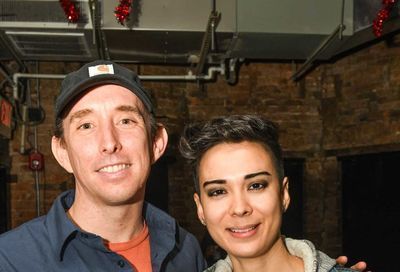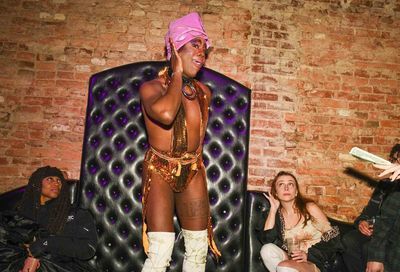Tales of the Tomlin
From drawers full of dimes to superstardom, Lily Tomlin shares the richness of her journey

Lily Tomlin
(Photo by Matt Hoyle)
MW: Have you been back recently?
TOMLIN: I played in one of the suburbs there maybe two months ago. My cousin and her family live there, in one of the suburbs. And I have all my old girlfriends from high school there — not in the inner city, because it’s really destitute. I went to high school with Henry Ford II’s widow and third wife [Kathleen DuRoss]. I’m going to play Palm Beach soon, so I’ll see her when I go down there.
MW: She’s a pal?
TOMLIN: Yeah! I got her on the cheer team. That’s the kind of place Detroit is. It was rich. It was an industrial city. With unions, it was a very political city, too. Not so white-bread and diluted down. It was zestier.
MW: With the tour, I don’t see a particular title. I’m wondering —
TOMLIN: I don’t do a tour like that. I never have. People ask me, “When did this tour start?” I say, “Oh, maybe several decades ago on my back porch.” I always put on shows. I don’t know where I got the notion. I mean, we didn’t go to the theater. But I did take ballet and tap and the Department of Parks and Recreation across the street from my old apartment house. It was kind of a tough neighborhood and we had a lot of programs to keep kids off the street. I pitched for a police athletic baseball team. All these different community groups were involved. And I took ballet and tap, as I said. In the summer, we played all kinds of sports. I was a jacks champion. When I was about 9, I played in the junior division.
MW: Junior division of jacks?
TOMLIN: Yeah.
MW: Sounds like you were involved in everything.
TOMLIN: I was! And in the old apartment house, there were so many different kinds of people. The older people there were professionals, but they were on limited incomes so they couldn’t move. They wanted to! All these blue-collar Southerners came up to work, like my mother and dad, so my dad could work in the factory. We had 40 apartments in our building, with a common backyard. It burned down in the ’67 riots. You think your backyard’s so big, but it’s like a postage stamp. But all the kids played in that backyard. People hung their wash on clotheslines. [Laughs.] It was a real community.
MW: Were you precocious?
TOMLIN: You could say precocious in some areas, maybe. [Laughs.] People used to let me babysit their kids when I was 10.
MW: Were you sort of the leader of the local kids?
TOMLIN: I don’t know. I took a leader role at some points. I was always producing shows! I wanted to do a show so bad and I would try to get the other kids to be in it, and they wouldn’t rehearse or show up. They just didn’t have the interest in it, and I did. I did magic tricks. I used to say I was the world’s first performance artist. I’d tap dance, I’d do ballet, I’d tell jokes I’d seen on television. I could cut a rope and restore it. I could float a ball under a silk. [Laughs.] What I — Do you really want to hear this?
MW: Yes!
TOMLIN: When I was pretty young, maybe 8, I’d come home from school and read a Red Ryder comic book. In the back they had all these joke items, like hand buzzers and dribble glasses. All this bad joke stuff. Plastic vomit. Ice cubes with flies in them. Anyway, it was, “C.O.D., send no money.” I’m thinking I’m the only kid hip enough to get this, so I’m going to get all these items for nothing. [Laughs.] I sent for all this stuff. I came home from school one day and my mother meets me at the door and says, “I want to know if you ordered a bunch of old junk from a comic book.” Oh, I was just elated and wanted to get my hands on it. She said, “You can have it when you pay me back.” I said, “How is a kid supposed to get any money?”
“You could do things for the neighbors.”
It was epiphanous. I told my mother later it was the most important thing she ever told me. I started a dime business. In those 40 apartments, I’d take out your garbage for a dime. I’d go to the store for a dime. I’d walk your dog for a dime. I had drawers full of dimes. Then I would take the money downtown to Abbott’s Magic Shop and I would learn a magic trick. I was mad for magic. But not sleight of hand. I was totally lazy, so I would buy apparatus. [Laughs.] I didn’t stay with it, but I was so fascinated by illusion.
MW: This apartment house was an amazing world for a kid.
TOMLIN: And there was a botanist who lived in the building, one of the retirees who couldn’t move. Mrs. Rupert. Mrs. Rupert had decided I was the kid in the building who had the most potential to “rise above my station.” Those are her words.
MW: Mrs. Rupert was right, I suppose.
TOMLIN: I was 8, and she got my mother to let me come over every night after supper. Her husband would be out, worked at the railroad. She was terribly, terribly interesting. She was a short woman, very zaftig, and here I was so lanky, but as tall as she was. So she was like a girlfriend almost, like another kid or something.
Support Metro Weekly’s Journalism
These are challenging times for news organizations. And yet it’s crucial we stay active and provide vital resources and information to both our local readers and the world. So won’t you please take a moment and consider supporting Metro Weekly with a membership? For as little as $5 a month, you can help ensure Metro Weekly magazine and MetroWeekly.com remain free, viable resources as we provide the best, most diverse, culturally-resonant LGBTQ coverage in both the D.C. region and around the world. Memberships come with exclusive perks and discounts, your own personal digital delivery of each week’s magazine (and an archive), access to our Member's Lounge when it launches this fall, and exclusive members-only items like Metro Weekly Membership Mugs and Tote Bags! Check out all our membership levels here and please join us today!


























